… and Other Reasons Why Survivors of Sibling Aggression and Abuse Don’t Tell Their Stories
Running. Hiding. Fighting back. Terrified. Angry. Invisible. Speaking out. Being ignored. Threatened into silence. Name-calling and teasing. Secrets. Sadness. Hoping I can stay at my friend’s after school. Hoping my toys aren’t destroyed again. Hoping they aren’t babysitting tonight.
These are our stories. This is what it looks and feels like to get beaten up, put down, or whatever form it took – or still takes. And telling our stories is how people who haven’t lived it will learn that sibling abuse is real. That the damage is real and what it looks like. How we have survived, grown strong and how we struggle still.
Our stories can change minds – and hearts. It isn’t easy to tell them though. It’s difficult to speak from such a vulnerable place. Especially when our abusers are still in our lives – and most often, they are.

When I first started talking about it, I was surprised to see the looks on people’s faces when I told them my story. Shock. Compassion. Horror. Confusion. Things that I thought were normal were apparently not normal at all. Those looks were part of my learning and healing.
When I was writing Broken Branches, and I’d tell people that it was a play about sibling abuse, I’d see them shift as they heard that phrase ‘sibling abuse’: first puzzlement, then, as they put the words together, understanding, then an awakening of sorts, “Of course it can be abuse. Why didn’t I think of that?” And, after watching the stories unfold onstage, people would say “That’s my story. I’ve never seen it anywhere before” or “I had no idea.” And most often, “Why aren’t we talking more about this?”
Stories are the fabric of history, of social change. It’s peoples’ stories of residential school, of war and political and racialized trauma that awaken us to these experiences. And our understanding of these experiences brings us together.
Stories really do matter. They change the world. Our lived experience matters and needs to be shared so that more generations of kids don’t have to live with that backdrop to their lives.
We can be part of that change. One story at a time.
There are many reasons why we don’t tell our stories. Perhaps if we understand why it’s so difficult, we’ll see that there are more reasons why we should.
Our stories matter.

10 Reasons Why We Don’t Tell Our Stories Of Sibling Abuse
- It’s normal. Brothers fight. Sisters are mean. Kids will be kids.
- Nobody will believe me
- They’ll say I’m:
- making it up
- exaggerating
- too sensitive, weak, a suck
- looking for someone to blame for my problems
- I deserved it
- They’ll say my sister/brother is:
- the Golden Boy/Girl
- successful, charming, funny
- a pillar in the community
- SO nice! They’d never hurt a fly.
- They love me. I must be … [see above]
- They’ll say I’m:
- What good will it do?
- Why rock the boat? Why create trouble? What would the neighbours and extended family think?
- What could possibly come out of it? I can’t change the past, so what’s the point?
- I’ll be seen as the abuser, for speaking out.
- It’s MY FAULT …
- that they:
- hit me
- punched me
- strangled me
- controlled and manipulated me
- mocked, teased and laughed at me
- ganged up with their friends against me
- touched me
- made me touch them
- broke/stole/gave away/hid/ruined my stuff
- threatened to kill me if I told anyone. I believed them.
- that I:
- didn’t tell anyone
- told someone but they didn’t do anything about it
- told the wrong person, my sib found out, and it got worse
- didn’t fight hard enough … it’s my fault for being so weak
- that they:
- I’ll lose my family. And I can’t, even if:
- I have to clench my teeth, remain silent, and not call out my sibling for the way they treat their kids (or spouse or our mother or father or their colleagues or …)
- I have a terrible time at family dinners and I leave in tears. Or, if I can hold the tears in, I’ll spend the next 3 days over-drinking/eating/working/gaming/Netflixing/sleeping … or crying
- I don’t want to hurt my sibling. Or shame my family.
- I love my sibling. I may have hated them as kids, hate what they did, and still sometimes hate them. But I also love them. We had lots of good times too.
- What happens behind closed doors stays there. We are not supposed to ‘air our dirty laundry’.
- It’s too painful.
- I already lived it. I don’t want to bring all of that up again.
- It happened a long time ago. I struggle with a lot of issues, but I’m managing.
- I don’t know how I’ll feel and that scares me more.
- Was it really ABUSE?! I don’t know if what my brother/sister did is actually why I have:
- shame
- self-hate
- anger and inability to control my temper
- lack of self-worth
- depression
- anxiety
- self-harm and suicidal thoughts
- a terrible relationship history
- There’s just something wrong
- with me
- I was born broken, flawed
- I have mental health issues. It’s a chemical imbalance
- with my sibling
- he/she was born broken, flawed
- he/she has mental health issues. It’s a chemical imbalance
- with me
- I’ve been saying it for years. Nobody listens. I’m done. I give up.
